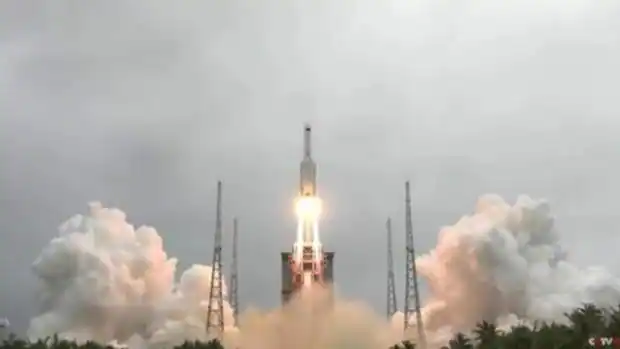 The fall of debris from the out-of-control Chinese rocket this weekend is causing a bitter confrontation between two of the main space agencies: NASA and the China Manned Space Agency (CMSA). Although the debris crashed into the Indian Ocean early Sunday morning (5:24 a.m. CET) without causing material damage, NASA Administrator Senator Bill Nelson has criticized
The fall of debris from the out-of-control Chinese rocket this weekend is causing a bitter confrontation between two of the main space agencies: NASA and the China Manned Space Agency (CMSA). Although the debris crashed into the Indian Ocean early Sunday morning (5:24 a.m. CET) without causing material damage, NASA Administrator Senator Bill Nelson has criticized
in a statement
The Asian giant's actions and lack of transparency: "It's clear that China is not meeting standards of responsibility regarding its space debris," he said hours before the rocket disintegrated and the largest parts fell to Earth.
This isn't the first time NASA and other international agencies have criticized the secrecy surrounding China's programs, and the fact that so little information has been offered about the out-of-control Long March 5B (made worse by the fact that an out-of-control rocket of the same model crashed over the Ivory Coast less than a year ago) has only served to inflam matters. "Spacefaring nations must minimize risks to people and property on Earth following the re-entry of space objects, while also maximizing transparency regarding those operations," Nelson stated, adding that "it is critical that China and all spacefaring nations and commercial entities act responsibly and transparently in space to ensure the safety, stability, and long-term sustainability of outer space activities."
China's position
In response, the Global Times—owned by the Chinese Communist Party's official organ, People's Daily—published an editorial on May 10, claiming that atmospheric reentry "is a globally common way of handling rocket debris, practiced by all space powers, including the United States," and that the episode involving its latest Long March 5B rocket has been the subject of "blatant exaggeration." "It all stems from people jealous of China's rapid progress in space technology," the newspaper states. The editorial emphasizes that "there is no evidence to show that the landing sites for US rocket debris are more controllable compared to those in China."
Unless a rocket is reusable – most famously SpaceX’s Falcon – there will always be “some uncontrollable factors,” the Global Times adds, explaining that over nearly 60 years of human space activities, the calculated fall of rocket debris has so far not caused any casualties (the only recognized victim of a space junk-related accident was Lottie Williams, who in Tulsa in 1997 was indirectly hit by a small 15-centimeter-long piece in her shoulder, causing no damage other than a bruise). “Furthermore, the risks of falling rocket debris are the same no matter who owns the rocket. It’s the opposite of intelligent to claim that China’s rocket debris is especially dangerous,” it concludes.
Debris from the Long March 5B Y2 rocket's core stage, approximately 30 meters tall and 5 meters in diameter, re-entered Earth's atmosphere at 02:24 UTC on May 9, with most of its parts burning up in the process, the CMSA reported. The reentry location was 72.47 degrees east longitude and 2.65 degrees north latitude, indicating it occurred somewhere between the Arabian Sea and west of the Maldives.
If all goes according to plan, China has announced plans for ten such launches by 2022, by which time it hopes to have its own international space station built.
